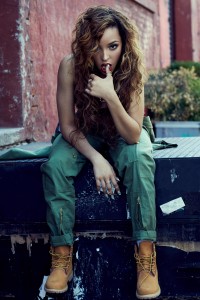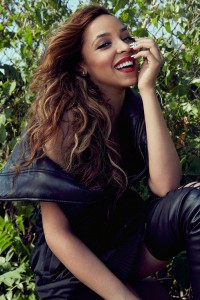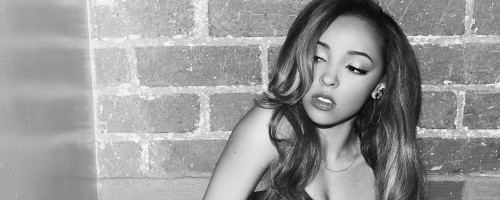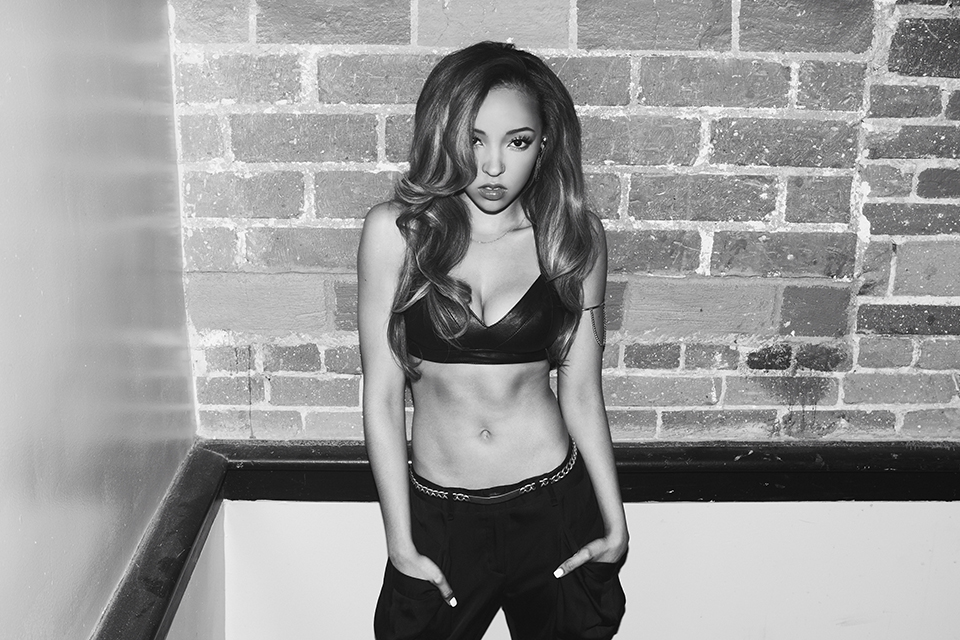Tinashe Kachingwe appears relaxed and casual as she settles on her high stool, phone rested.
“I never met her still,” she goes on to say with a grin, when the topic of Nicki Minaj arises. The answer comes as an obvious surprise given that it’s a few hours before The Pink Print Tour in Toronto – a tour that Tinashe has been a guest performer on since March.
“Every time I say that, people are like, ‘Whaat?’ I know, it’s crazy.” She goes on to explain the challenges of conflicting stage times, security levels and the like. “It’s not as simple as you would think … but I will [meet her] though, don’t get it twisted.”
Wearing a plain oversized grey T-shirt, with light makeup and white polished nails, it would be easy to confuse Tinashe – who about a month prior performed a tribute to all-time great Janet Jackson at the BET Awards – for an everyday 22-year-old girl next door.
But with four mixtapes, a full-length album and several hits, including platinum-selling single, “2 On” featuring Schoolboy Q, under her belt, Tinashe is well on her way to proving she is anything but ordinary.
YOU’VE BEEN ON THE PINK PRINT TOUR SINCE MARCH. DESCRIBE THE EXPERIENCE. I’ve had a great time so far on the tour. It’s been a really fun experience, a great energy every night on stage. All the openers are really fun, DeJ Loaf is amazing, Rae Sremmurd is dope. We’ve all been kicking it backstage. So it’s just been good energy, great vibes.
IT’S BEEN A LONG TOUR SO FAR, ARE THERE ANY PARTICULAR ASPECTS THAT STAND OUT TO YOU? Obviously the Twitter drama’s been interesting, an interesting element. But the biggest thing for me personally is just being able to connect with the other artists one on one. Just to hang out with, like DeJ and Rae Sremmurd, that’s always fun. Because most of the time when you’re around other artists it’s all work, and it’s very hard to break that kind of fourth wall between two acts passing each other backstage at a show and actually hanging out.
I’ve definitely gained some respect in the music community on that side of things. So people know that I’m not just some cute girl, with just a song. They know that I’m in this for real.
 THINGS WERE CLEARLY DIFFERENT FOR YOU A YEAR OR TWO AGO. WHAT DO YOU ATTRIBUTE THIS CRAZY TRANSITION TO MOST? I think it’s tunnel vision. I’ve been working really, really hard on this obviously years before anyone saw the success of it, so finally it’s coming to fruition and it’s really exciting for me, but we’ve been putting in the time, putting in the work. We haven’t been taking any breaks. It’s going non-stop and we’re giving 100 per cent every time.
THINGS WERE CLEARLY DIFFERENT FOR YOU A YEAR OR TWO AGO. WHAT DO YOU ATTRIBUTE THIS CRAZY TRANSITION TO MOST? I think it’s tunnel vision. I’ve been working really, really hard on this obviously years before anyone saw the success of it, so finally it’s coming to fruition and it’s really exciting for me, but we’ve been putting in the time, putting in the work. We haven’t been taking any breaks. It’s going non-stop and we’re giving 100 per cent every time.
SPEAKING OF TRANSITION, WHAT ARE THE DIFFERENCES IN HOW YOU WILL HANDLE THIS NEW ALBUM FROM AQUARIUS? With the new album, the biggest difference for me is that with the first album I had to go through a lot of auditions in a way. Like when I would work with a producer for the first time and they weren’t necessarily familiar with who I was or what I wanted to do, or maybe they were familiar but didn’t necessarily respect it at that point. With this album it’s a lot easier. I’ve definitely gained some respect in the music community on that side of things. So people know that I’m not just some cute girl, with just a song. They know that I’m in this for real and because of that the process of creating the music has been much more collaborative and just way easier.
If you sign to a label expecting them to do everything for you, you’re going to be very, very disappointed … it’s more about, you got to make the shit happen yourself and then they can help you with budgets.
 YOU’VE SAID YOU HAD A LOT OF ARTISTIC CONTROL WHEN YOU WERE ON THE INDEPENDENT GRIND. HOW DO YOU COMPARE THAT SITUATION TO WHERE YOU ARE NOW? Before I went solo, I was in a girl group and we were on a couple of different labels, so I experienced the label situation first hand. In that group especially, I didn’t have any type of creative control and for me that kind of sucked. So when I was finally able to just be my own person, make my own decisions, I was super liberated. I was all about it, I was like, ‘Yeah! Independent for life, this is the best!’ but I’ve also grown to realize the incredible asset that a label can provide for you if you use them in the correct way. If you sign to a label expecting them to do everything for you, you’re going to be very, very disappointed. They don’t do artist development anymore, you basically have to create yourself as an artist and they just give you a platform. They can help promote you and get onto the radio. The new way that I look [at] my record label is better than how I did before. It’s not as collaborative as you would think, it’s more about, you got to make the shit happen yourself and then they can help you with budgets.
YOU’VE SAID YOU HAD A LOT OF ARTISTIC CONTROL WHEN YOU WERE ON THE INDEPENDENT GRIND. HOW DO YOU COMPARE THAT SITUATION TO WHERE YOU ARE NOW? Before I went solo, I was in a girl group and we were on a couple of different labels, so I experienced the label situation first hand. In that group especially, I didn’t have any type of creative control and for me that kind of sucked. So when I was finally able to just be my own person, make my own decisions, I was super liberated. I was all about it, I was like, ‘Yeah! Independent for life, this is the best!’ but I’ve also grown to realize the incredible asset that a label can provide for you if you use them in the correct way. If you sign to a label expecting them to do everything for you, you’re going to be very, very disappointed. They don’t do artist development anymore, you basically have to create yourself as an artist and they just give you a platform. They can help promote you and get onto the radio. The new way that I look [at] my record label is better than how I did before. It’s not as collaborative as you would think, it’s more about, you got to make the shit happen yourself and then they can help you with budgets.
I would like, in a way, to be able to have this new version of R&B reignite interest in the genre.
GIVEN WHERE YOU ARE RIGHT NOW, WHAT PIECE OF ADVICE DO YOU WISH YOU COULD TELL YOUR YOUNGER SELF? The first thing I would say is that nothing is going to happen in the timeframe that you think it will or that you hope it will, but that’s okay, it’ll still work out. Don’t get discouraged, because I’ve obviously been able to continue to push through and eventually everything would work itself out. It’s just reminding myself to be patient and just enjoy the time that I do have.
FINALLY, BECAUSE YOUR BRAND IS BIRTHED IN R&B, WHAT’S YOUR TAKE ON THE CURRENT STATE OF THE GENRE? SOME PEOPLE FEEL LIKE IT’S DYING IN ITS TRADITIONAL FORM. I definitely think that the traditional version of R&B is less prominent than it has been in the past. I don’t think it’s ever going to die. There’s always going to be people who are going to be a fan of it. Things just go in and out of being popular and I think that right now, R&B is definitely shifting and changing, but I don’t think that’s a bad thing, I actually think that it’s a great thing because all genres are going through a transitional period. Pop, rock ‘n’ roll, even country, are seeing a lot of blending of the genres with other influences mixing them up. I think that’s it’s cool for R&B to be able to be a part of it. I would like, in a way, to be able to have this new version of R&B reignite interest in the genre.





1 Comment
Pingback: 5 poppin' women singer-songwriters poised to take over 2018